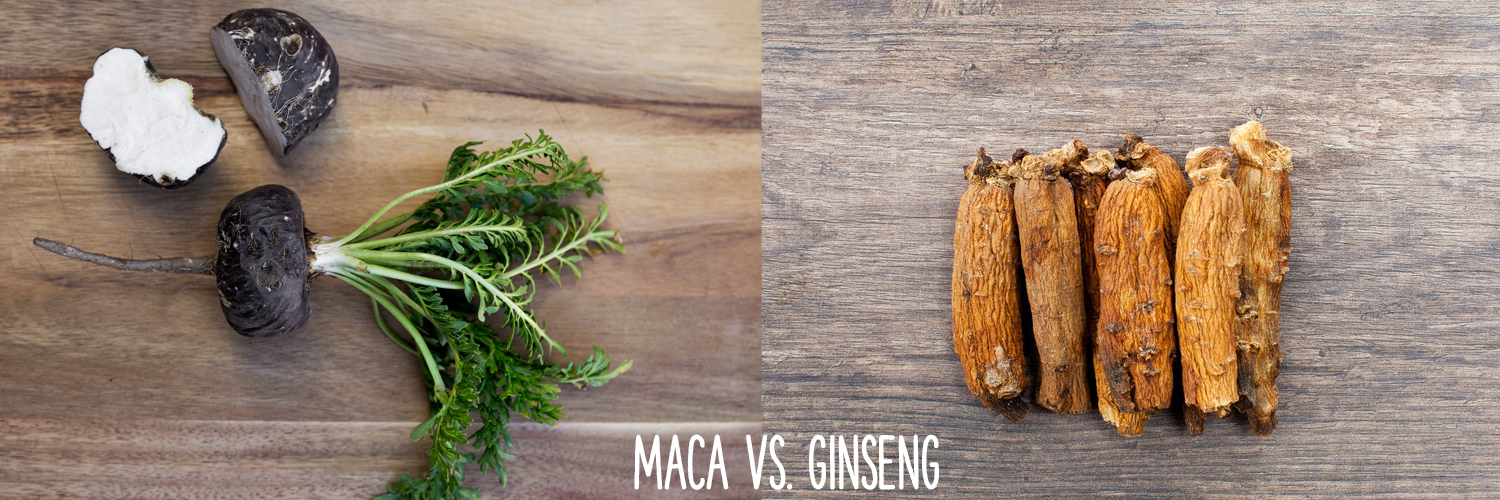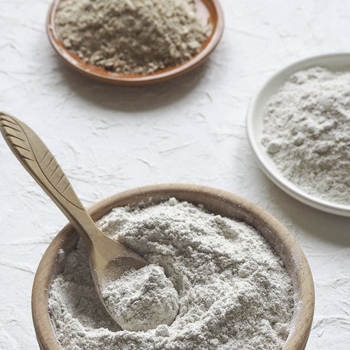What’s the Difference between Maca and Ginseng?
 Two of the most powerful adaptogens on the planet, maca and ginseng, are often compared to each other. Heck, maca even gets called “Peruvian ginseng” sometimes!
Two of the most powerful adaptogens on the planet, maca and ginseng, are often compared to each other. Heck, maca even gets called “Peruvian ginseng” sometimes!
Ginseng root, a common herbal medicine revered in Chinese medicine, has been more widely known for longer. More recently, the maca root is gaining attention. Hailing from the mountains in Peru, it’s been widely used by native communities high in the Andes Mountains for generations. Recently, the rest of the world is catching on to what Peruvians have known all this time: maca is a powerful adaptogen and superfood with multiple health benefits.
The two do share quite a few similarities, but they’re not interchangeable. How are they different? How are they similar? Read on, and you’ll be an expert on using each for best results for everything from anxiety to libido to your overall health.
1. Energy increase in two weeks or two months? Maca gets you there quicker.
Both maca and ginseng are great for increasing energy, focus, and alertness. When coffee just isn’t working for them, many turn to maca or ginseng for energy stimulants without the crash. A study at the Mayo Clinic with cancer patients struggling with fatigue found that though four weeks of use didn’t provide much result, continuing to take ginseng daily improved their energy after eight weeks. In contrast, A study on maca published in the National Center for Biotechnology Information included results of increased performance for cyclists after just 14 days of use.
Unlike coffee, both of these adaptogens may require regular use to get the full energy-boosting benefits. But also unlike coffee, neither will give you that post-coffee slump.
2. Sexual health concerns? Choose maca for libido and balanced hormones; ginseng for ED.
Both ginseng and maca are often used for sexual function, from libido to erectile dysfunction and more. But here’s an important area to know the differences between the two: both are energy enhancers, but generally maca is the one that may improve libido in both men and women. Ginseng, on the other hand, is used for men—and usually not for sexual desire but for erectile dysfunction.
In addition to its benefits to libido, maca is often used to balance hormones. This can assist women experiencing symptoms of menopause and peri-menopause. It may provide relief from hot sweats and restless sleep, along with help for a lagging libido.
Maca, which may assist with multiple hormone-related conditions, has a more well-rounded assortment of potential benefits in sexual health.
3. Both maca and ginseng are adaptogens.

Adaptogens are plants that help us “adapt” to stress. Both of these impressive adaptogens are known to improve mood and relief stress. But each work on helping you with your stress in different ways. Ginseng works to reduce inflammation, whereas maca works to balance hormones, according to Amy Myers MD. It’s thought that ginseng’s affects on stress may be due to increasing blood flow to the brain.
Maca, in contrast, assists in battling chronic stress by balancing hormones, as we’ve mentioned before for menopause. Rather than taking hormone supplements, maca provides the building blocks for balanced hormones—amino acids—to help your body regulate its hormones naturally. We often think about hormones when we’re talking about sexual health. But hormone balance is great for so much more than just menopause and sex life! From depression and anxiety to memory to digestion to hair loss: an imbalance in hormones can affect your entire body.
4. Overall health: superfood maca also provides high nutritional benefit.
Both maca and ginseng are regularly used for everything from energy to sex drive to stress relief to strengthening the immune system. With so many potential benefits, it’s fair to say both are a good resource for improving your overall health.
Maca is also a superfood, meaning it has a high level of nutritional benefit for the calories consumed. Because of all these additional nutrients, maca provides deep whole-body benefits. It’s full of essential amino acids and fatty acids, and high in vitamins and minerals. In fact, it has more potassium than a glass of milk and is loaded with both fiber and protein.
5. Health benefits don’t have to taste terrible! Maca wins in taste tests hands down.
If you’ve had a ginseng tea from your local Chinese shop, you know it can be quite bitter. Though worth the bitter taste, the flavor can make it more difficult to include in your regular habits. Maca, with its mild flavor, can be easily added to drinks, smoothies, and oatmeals, to mention just a few.
Because both ginseng and maca provide their full benefits when taken daily, explore ways to make these adaptogens an easy part of your daily practices. Perhaps that means ginseng is taken as a pill, or maca becomes the regular part of your morning smoothie.
Whatever adaptogen habits you build to support your health and battle chronic stress, both ginseng and maca can help get you there. It’s only up to you to set that daily habit on the road to health.
Breaking Down Maca vs Ginseng
|
Health Need |
Maca |
Ginseng |
|
Libido |
X |
|
|
Erectile Dysfunction |
|
X |
|
Hormone Balance |
X |
|
|
Energy Boost |
X |
X |
|
Stress relief |
X |
X |
|
Mood booster |
X |
X |
|
Immune system boost |
X |
X |
|
Overall well-being |
X |
X |
|
Superfood nutrition |
X |
|
|
No bitter taste for ease of regular use |
X |
|
|
Comes in capsules, powder and extracts |
X |
X |
|
Cost effective |
X |
|
We hope this article was helpful to you.
If you have any questions, please let us know. We're always happy to hear from you.
Find out which maca we recommend for you
Enjoy the day!
![]()
